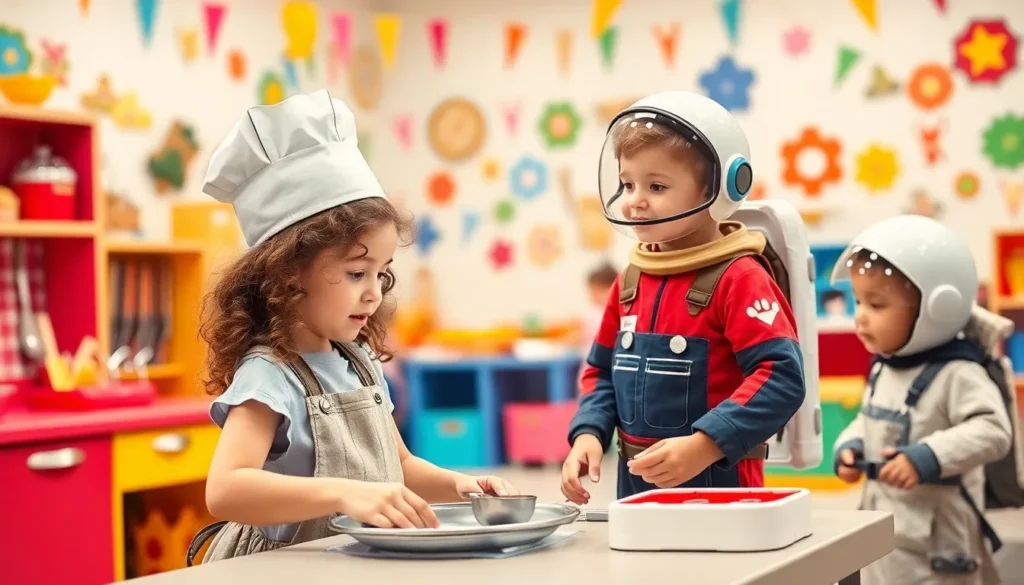Table of Contents
ToggleImagine a world where kids can be anything from a fearless astronaut to a charming chef, all while wearing mismatched costumes and wielding oversized props. Welcome to the early childhood dramatic play center, a magical realm where imagination knows no bounds. Here, young minds dive into role-playing adventures that spark creativity and build essential social skills.
What Is an Early Childhood Dramatic Play Center?
An early childhood dramatic play center is a designated area where young children engage in role-playing activities. This space encourages them to explore different scenarios, such as being chefs, doctors, or astronauts. Such play fosters not only creativity but also important social skills. Children learn to communicate, collaborate, and negotiate with peers while immersed in imaginative settings.
Dramatic play centers often include costumes, props, and thematic areas that reflect real-world experiences. For instance, a kitchen setup allows children to mimic cooking and serving food. A doctor’s office encourages them to play the roles of doctors and patients. These setups invite children to express their ideas, emotions, and experiences through play.
The importance of dramatic play in early childhood development cannot be overstated. Engaging in such activities aids in language development, as children communicate their thoughts and feelings. Additionally, they practice problem-solving skills as they navigate various scenarios and collaborate with friends.
Teachers and caregivers play a vital role in enhancing the dramatic play experience. They can introduce new themes, provide appropriate materials, and gently guide interactions when necessary. Observing children’s interactions in this setting offers insights into their emotional and social development.
Creating an effective early childhood dramatic play center involves careful planning and consideration of the children’s interests. Regular updates to the themes and materials ensure sustained engagement. In summary, these centers serve as invaluable tools for learning and growth in early childhood education.
Importance of Dramatic Play in Early Childhood

Dramatic play significantly contributes to a child’s growth and development. Engaging in imaginative roles allows children to navigate social situations, express emotions, and understand the world around them.
Benefits for Social Development
Dramatic play fosters critical social skills. Children learn to take turns while engaging in role-playing activities. Negotiating roles during play helps them develop teamwork. Communication skills also flourish as they articulate ideas and emotions. Exposure to diverse scenarios encourages empathy, allowing kids to understand perspectives beyond their own. Developing friendships becomes easier through shared play experiences in these centers.
Enhancing Cognitive Skills
Cognitive skills expand through the exploration of dramatic play. Imaginative scenarios stimulate critical thinking and problem-solving abilities. Children apply logic when navigating various situations and make decisions about their roles. Creativity soars as they invent narratives and adapt to changing circumstances. Language development occurs as they engage in dialogue, enhancing vocabulary and comprehension. Engaging in thematic play encourages children to connect concepts, promoting broader understanding across subjects.
Setting Up an Early Childhood Dramatic Play Center
Creating an early childhood dramatic play center requires careful thought and consideration. Selecting the right location and appropriate materials plays a vital role in maximizing children’s engagement.
Choosing the Right Location
Placement of the dramatic play center significantly impacts children’s interaction. Design a space that is easily accessible yet separate from high-traffic areas to minimize distractions. Allocating sufficient space enables children to engage fully in their role-playing activities. Consider natural light, as it contributes to a welcoming atmosphere. Establish boundaries using furniture to create a distinct area while allowing flexibility. Proximity to related learning areas can also enhance the experience by encouraging smooth transitions between activities.
Selecting Appropriate Materials and Props
Diversity in materials and props enriches the dramatic play experience. Choose items that reflect real-world roles and scenarios, such as tools found in a kitchen or medical office. Incorporate costumes that allow for easy dressing and inspire creativity. Variety encourages children to explore different narratives and fosters imagination. Include items that support various themes—imaginative play benefits from unique props like food items, cash registers, and play equipment. Regular rotation of materials maintains interest and stimulates new ideas, ensuring continuous engagement and learning opportunities.
Activities to Incorporate in the Dramatic Play Center
Children thrive when engaged in diverse activities that enhance their imaginative play. Incorporating various elements enriches their experience and promotes learning.
Role-Playing Scenarios
Role-playing scenarios stand at the core of dramatic play. Scenarios like grocery shopping or visiting the veterinarian allow children to mirror real-world experiences. Children gain insight into social dynamics while practicing problem-solving. They negotiate roles and explore consequences, enhancing their emotional intelligence. A scenario featuring a space mission ignites curiosity about science and teamwork. By taking on different professions, children develop vocabulary relevant to each role and scenario.
Themed Play Areas
Themed play areas create immersive environments for learning. For instance, a kitchen area includes utensils, play food, and aprons, encouraging cooperative cooking adventures. Children can role-play as chefs, learning about nutrition and teamwork. A doctor’s office theme promotes understanding of health and empathy. Each area sparks imagination, expanding the children’s understanding of various professions and daily activities. Regular updates, such as seasonal themes, keep the play stimulating and relevant. Themed areas not only engage children but also serve as platforms for developing communication skills and social understanding.
An early childhood dramatic play center serves as a vital resource in nurturing young minds. By providing a space for imaginative exploration children develop essential social and cognitive skills that lay the foundation for future learning. The carefully curated environment fosters creativity while encouraging communication and collaboration among peers.
Regular updates and diverse activities keep the experience fresh and engaging ensuring that children remain stimulated and motivated. As they navigate various roles and scenarios they not only learn about the world around them but also gain valuable insights into social dynamics and problem-solving.
Ultimately these centers are more than just play areas; they’re integral to a child’s development in a fun and interactive way.










